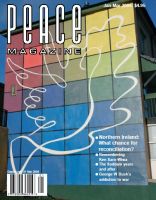
Peace Magazine Jan-Mar 2006, page 6. Some rights reserved.
Search for other articles by Theresa Wolfwood here
Perhaps because of the pressure or a guilty conscience, 37 recruiters have deserted the military too
Imagine a slight, pretty young woman pointing a machine gun at terrified women and children, lying on their stomachs on the floor. A scene from a Hollywood movie about druggies and gangsters? No! This is the real world of Iraq. The young woman looks into the eyes of her captives and sees their fear and hatred. She begins to realize that these are the people she was told she came to help.
When the Colorado National Guard recruiters came to her school, eight years ago, they persuaded Kelly Dougherty that she could serve her country in domestic disasters like floods and earthquakes. Kelly, now 26 years old, says these recruiters are very persuasive and persistent - particularly in schools in low income and poor areas of the United States. The National Guard offers a chance for paid higher education to these kids who otherwise might not afford to go to university. In 2003 Kelly was sent to Iraq to be in the military police.
The other job of the military police was to guard transport vehicles that were stopped or broken down. These were all owned by Halliburton (Vice-President Dick Cheney's former company) and used for carrying medical supplies, fuel, equipment, and food from Basra. These trucks often killed people and animals. Kelly recalled seeing a flattened goatherd, a child who had been run over with his goats on the road. She wondered again why she was there. The police had to protect the trucks from Iraqis who gathered around to see if they could get something. After a few hours, the police were often ordered to blow up and burn the loaded vehicles rather than let "the Iraqi looters" benefit.
Kelly came home sick of the war and left the military. She said she was opposed to the war before she went to Iraq but thought that they would do some good for the people after the war. She believes now that this violent war of occupation perpetuates violence. She also knows the war is based on lies; it was always intended to serve oil interests.
She says that the war is bleeding people and communities in the United States, as public services are cut to support the war of that debt-ridden nation. Kelly is not alone in her beliefs; she says most soldiers stationed in Iraq want to leave, knowing they have no right or purpose to be there.
The United States does not treat its veterans well either, she says. Returned soldiers who are sick or suffering from radiation illness from the hundreds of tons of depleted uranium used in Iraq are not helped and their sickness is often not recognized.
During her service overseas, Kelly Dougherty saw the US military "treat Iraqis like trespassers in their own country." She accuses the Bush administration of "perverting people's sense of patriotism for their own greed."
While she was speaking in Canada, Kelly called on Canadians (whom she respects for staying out of the war) to support US war resisters. Her call is joined by that of Tom Hayden, a political activist for decades and an 18-year member of the California Assembly and Senate, who has also visited Canada to meet activists and politicians. He says, "Thousands of troops are refusing to fight Bush's war in Iraq. These are young people who volunteered to defend their country, thinking it was under attack. But now they realize this war is not about defending America. It is about fulfilling the unbridled ambition of the Bush administration."
Hayden called on Canadians, "Together, Celeste (whose son was one of 2000 US soldiers to die in Iraq) and I are asking for Canadians' help in ending this madness in Iraq. During America's darkest moments, Canada has provided a sanctuary for young men and women who refuse to fight Washington's wars. It is becoming clear that Canada is once again needed to play that role."
He told Canadians that "the Bush administration is forcing public schools to hand over their lists of students' names and phone numbers to military recruiters. In some cases, high school students have been offered $5,000 to quite literally sign their lives away to military recruiters. Perhaps because of the pressure, or a guilty conscience, 37 recruiters have deserted the military too."
Richard Hill writes in the May, 2005 issue of New Internationalist that the single largest ethnic group in the USA military are Mexicans and Mexican descendents. There are also Puerto Ricans, Dominicans, Central Americans and Ecuadorians. Many join because they are promised green cards and a possibility of US citizenship and other benefits. One-third of US troops in Iraq are non-citizens.
On June 1, the Australian paper Green Left Weekly reported that 10,000 Ugandans are being recruited to work as "security personnel" in Iraq and US military bases worldwide in a recruitment exercise approved by the US State Department. The local law firm doing the recruiting has emphasized that the youths will not be in "combat" roles but "guard" duties, and some secretarial work. Ugandan MP Aggrey Awori asks, "How do you provide only guard services in a country like Iraq? These people will shoot back when shot at."
The Army also has found fertile ground for recruitment in the poor Pacific Islands. The Army minimum signing bonus is $5,000. Starting pay for a private first class is $17,472. Education benefits can be as much as $70,000. This is far more than they can earn in five years. Everyone from beauty queens to laid-off sweatshop workers see the US Army as a chance to get an education and a stake -- despite their compatriots' deaths.
Theresa Wolfwood is an activist in Victoria BC. See www.bbcf.ca

Peace Magazine Jan-Mar 2006, page 6. Some rights reserved.
Search for other articles by Theresa Wolfwood here